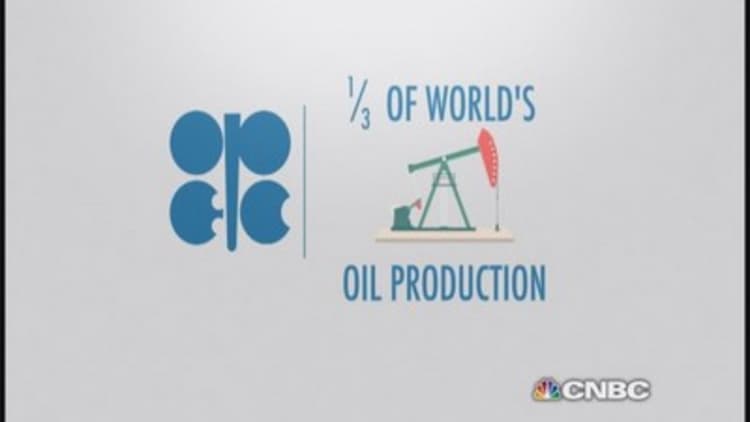
U.S. stocks closed mixed on Black Friday amid a slide in oil prices following OPEC's announcement that it would not cut its output.
The Dow Jones Industrial Average eked out a record close by 0.49 points, ending the month without having lost ground in back-to-back sessions since Oct. 15-16.
Friday was the final trading day of November, and the Dow and S&P 500 posted a second straight month of gains and the 8th in 11 months this year. Both indexes barely held onto their 6th straight week of gains, their longest winning streak in a year.
The S&P 500 Energy Sector entered bear market territory with a plunge of more than 6 percent, the biggest since August 8, 2011 following the S&P downgrade of the U.S. credit rating. The sector also had its worst week in more than 3 years with a decline of more than 9 percent.
"I think the weakness in energy has spooked some people and there's some profit taking going on," Marc Chaikin of Chaikin Analytics said. He has a target of 2,150 on the S&P 500 by the year's end.
The Dow Jones Industrial Average came off its highs after rising more than 50 points on Wal-Mart's 3 percent gains, shaking off Chevron's 5 percent decline and Exxon Mobil's 3 percent loss.
Read MoreBest Buy's website suffers Black Friday outage
Earlier, the Dow Jones Transportation Average rose more than 1 percent to an intraday record, with airlines JetBlue and Southwest leading the rally, but lost all those gains as railroads declined and oil barge operator Kirby lost more than 6 percent.
"The one issue with transportation stocks is the railroad stocks have made a lot of money transporting shale oil," said Peter Boockvar, chief market analyst at The Lindsey Group.
Major oilfield service provider Schlumberger lost about 7 percent, while competitor Halliburton closed down nearly 11 percent.
Read MoreWill OPEC bankrupt shale producers?
On Thursday, the 12-member oil cartel OPEC announced it would hold its output target at 30 million barrels per day, triggering a sharp decline in oil prices. The decision surprised some market professionals, who had forecast that Saudi Arabia would push through a cut.
Crude touched four-and-a-half-year lows on the news and traded below $70 a barrel on Friday.

"I think we'll see the real effects of oil prices next week on Monday," said Peter Cardillo, chief market economist at Rockwell Global Capital. "I think U.S. markets will stay range-bound (today)."
He was surprised by OPEC's decision not to cut production and attributed the move to geopolitics.
Read MoreOil stocks, currencies tank on OPEC move
Boockvar cautioned that a decline in oil prices would likely cast a shadow on U.S. economic growth, as stocks have been correlated with oil prices for the last ten years.
"If this industry is on the cusp of a downturn, well, we'll have bigger risks," he said, citing a February Manhattan Institute study that said the oil and gas industry has contributed $300 to $400 billion to the economy annually and is associated with 10 million U.S. jobs.
Major U.S. Indexes
The Dow Jones Industrial Average eked out a record close, up just 0.49 points, or 0.00 percent, at 17,828.24, led by Wal-Mart, with Chevron falling more than 5 percent to lead declines among the eight blue-chip laggards.
The lost 5.25 points, or 0.25 percent, at 2,067.58, with consumer staples leading gains and energy falling 6.26 percent as the greatest of the three declining sectors.
The Nasdaq closed up 4.31 points, or 0.09 percent, at 4,791.63.
The Nasdaq closed up 1.7 percent on the week, its first 6-week win streak since February 2013. The index also posted a second month of gains, but only its 7th in 11 months (it was down in April while the others were higher).
The CBOE Volatility Index (VIX), widely considered the best gauge of fear in the market, traded near 13.
The 10-year Treasury note yield fell to 2.19 percent. The U.S. dollar gained against major world currencies.
Crude oil futures traded down $6.36 at $67.32 a barrel on the New York Mercantile Exchange as of 1:22 p.m. Gold futures for February settled down $22 at $1,175.50 an ounce.
Three stocks declined for every two advancers on the New York Stock Exchange, with an exchange volume of 639 million and a composite volume of 2.4 billion.
Volume was below average in an abbreviated Black Friday trading session as U.S. markets closed at 1 p.m. ET.
Read MoreFive things to watch on Black Friday
No major economic data was due from the U.S. on Friday. No big name companies reported earnings. U.S. markets were closed on Thursday for the Thanksgiving holiday.
Next week, U.S. markets will consider a slew of economic data, including the all-important jobs report.
Futures traded mixed around the flatline on Friday after global markets were hit by OPEC's announcement that it would not cut its output.
—CNBC's Robert Hum and Peter Schacknow contributed to this report.


